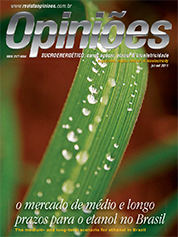José Luiz Olivério
Vice-President of Technology of Dedini
Op-AA-29
In our favor we have a great history
The sugarcane-based energy industry, from the production point of view, requires a vision and planning for the medium- and long-term. Decisions made today, on maintaining, renewing or expanding sugarcane plantations and industrial installations, will show results in 1 or 2 years with respect to the existing mills, while the actions required to build new units will require periods of 3 to 5 years.
The balancing of actions aimed at supply, with those that are determinant for consumption is key for reliability concerning the industry’s expansion, making ethanol an international commodity. We are experiencing a critical phase, given that demand has increased, while supply has remained stagnant since the 2008/2009 harvest.
In the international scenario, the conviction of the need to gradually replace fossil fuel with renewable alternatives has been consolidated. The recommendation of the U.S. Environmental Protection Agency – EPA, as concerning the use of advanced fuels, including Brazilian ethanol, is a positive indicator for the medium-term.
In addition, the ethanol import tariff barriers are expected to be eliminated, so the export scenario for the Brazilian product is a bright one.
In the domestic market, demand for flex-fuel vehicles is expected to remain in high gear with the increase in the population’s purchasing power. The determinant marketing factor will be the price of ethanol at the fuel pump, in a scenario in which gasoline shows a trend towards stability, in the medium-term.
Emphasis too is expected to be placed on bio-products derived from ethanol that will all put pressure on demand. The projections for ethanol demand indicate that until 2020 production will probably double, representing an increase of more than 400 million tons of processed sugarcane in some 100+ new large mills. These projections reveal a highly promising scenario for the domestic market.
The critical current situation in the ethanol market shows the need for private and public agents to act in a coordinated way, so that government policies and structural conditions can warrant the continuity of investments needed for the production sector.
The challenge to be faced in coming years, also to recover from the current supply crisis, will consist of the task of analyzing market trends and implementing effective policies and actions, bringing about the balance between production and consumption, with the aim of achieving the industry’s harmonic growth.
Transforming ethanol into an international energy commodity will cause a reduction in specific profitability per ton of processed sugarcane, unless the current scenario is changed. However, maintaining profitability is essential for the industry’s sustainability and hence, new technologies must be introduced to maximize sugarcane yield, the efficiency of processes, the reduction in the consumption of diesel and chemical fertilizer, and the generation of new products with higher aggregate value.
Processing unrefined sugarcane in a mill will result in cost reductions and will generate new and more revenues, to be added to those of current products. The Brazilian equipment industry has the capacity to do this and can provide advanced solutions, new mills and expansions that will make it possible to increase crushing by 70 million tons of sugarcane/year, exceeding the projected increase in consumption by more than 50%. Thus, one can recover lost demand and face optimistic growth in international and domestic markets.
Apart from mechanisms such as energy policy, regulatory framework, tax policy, among others, and in order to warrant reliability of entrepreneurs and investors possibly interested in the program, it is essential that there be financing available to prioritize solutions entailing higher technological content.
Such financing must be organized according to new projects, for the expansion of mills and modernization, under favorable conditions, given the strategic importance and the need for accelerated growth in the supply of ethanol. By prioritizing such more developed technologies, the financing signals to the market the preferred route to take, inducing the adoption of innovations.
In conclusion, in the Brazilian industry of equipment for the sugarcane-based energy sector, we are faced with a challenging two-sided scenario. The first entails major challenges due to quasi explosive growth in the demand for ethanol. The second is a threat: the country offers a market of gigantic proportions, but at the same time, our structural features, along with the outdated foreign exchange rate and fiscal exemptions favored unfair imports that will lead us to “de-industrialize”.
We are qualified to overcome the first challenge. To overcome the second, we need to harness our own capacity to achieve support from society and government.
History is in our favor: we nowadays have the most developed, competitive, and technologically advanced sugarcane-based energy industry that stands as an example for the world. It has been built up as a fundamental contribution of the Brazilian equipment industry. This fact reinforces our trust, but we cannot stop fighting!




